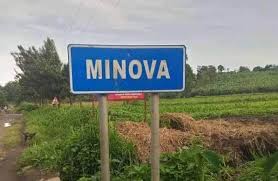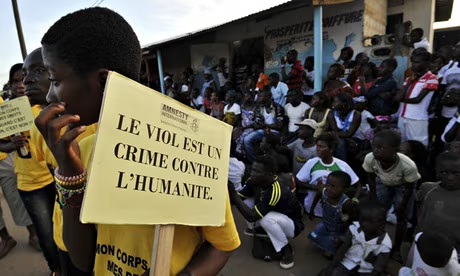18 December, 2017
Freetown, Sierra Leone. Two survivors of the 2014 Ebola outbreak in Sierra Leone, with support from the Centre for Accountability and Rule of Law, today filed a complaint with the ECOWAS Court of Justice claiming that the Government of Sierra Leone violated its citizens’ right to life and health by mismanaging funds meant to respond to the Ebola virus disease. The 15-page application filed with the Court claims as follows:
- That the government violated its citizens’ right to life by failing to adhere to relevant accounting and procurement controls which led to the loss of one third of the available resources, and was responsible for a greater number of deaths from Ebola than would otherwise have occurred.
- That the government violated its citizens’ right to health by failing to dedicate maximum available resources to the Ebola response, adding that the Government’s poor stewardship of the Ebola funds diminished the human and physical resources needed to handle the Ebola outbreak. This included the lack of healthcare workers, ambulances, basic medical supplies, and post-Ebola medical and psychosocial support.
- That the government has failed to conduct an effective investigation into the violations of the right to life and the right to health caused by mismanagement of the Ebola funds, and that such investigations are essential to ensure accountability and prevent future violations.
The African Charter on Human and Peoples’ Rights, the United Nations Universal Declaration of Human Rights, and the Constitution of the Republic of Sierra Leone all guarantee the right to life and the right to health.
In February 2015, the Auditor-General of Sierra Leone issued a “Special Audit” report, which showed that 30% of the Ebola response funds managed by the Ministry of Health within five months of the outbreak could not be fully accounted for. Crucially, the report noted that the lapses in the management of the funds resulted in “a reduction in the quality of service delivery in the healthcare sector.” In other words, mismanagement of the Ebola funds meant that the response was not as effective as it should have been, and as a result, more infections and deaths occurred. Nearly three years after the report was published, the Government of Sierra Leone has declined to investigate or otherwise meaningfully act upon the findings of the Audit Service.
“In the last three years, Sierra Leoneans have repeatedly demanded accountability and justice for the mismanagement of Ebola response funds, but their demands have fallen on deaf ears. This is an effort mainly by victims to hold the State to account as well as help them get a sense of closure,” said Ibrahim Tommy, Executive Director, Centre for Accountability and Rule of Law.
The Registry of the ECOWAS Court of Justice is expected to serve the application on the Government of Sierra Leone shortly, but oral hearings may not be held until next year. The ECOWAS Court has jurisdiction to hear human rights claims brought by individuals or public interest plaintiffs. If successful, this would be the first time the regional tribunal would establish a formal link between mismanagement of public funds and the violation of human rights. Sierra Leone was finally declared Ebola-free in January 2016, after 14,124 confirmed cases and 3,956 deaths.
The Centre for Accountability and Rule of Law (CARL), a Sierra Leonean civil society organisation, is committed to promoting human rights through accountability. Established more than a decade ago, CARL’s mission to work towards a just society for all persons in Sierra Leone through monitoring, advocacy for accountability and institutional transparency, and citizens’ empowerment.
Contact: Ibrahim Tommy, Executive Director, CARL: ibrahim.tommy@gmail.com
Michael Imran Kanu Esq, Counsel for plaintiffs: Michael Kanu: michaelimrankanu@gmail.com
Gaye Sowe, Institute for Human Rights and Development in Africa, Counsel for Plaintiffs: gsowe@ihrda.org
Updates
5 July 2018: Case called for hearing and adjourned indefinitely to allow both parties to explore the option of settlement, as requested by Government of Sierra Leone.
24 January, 2019: A joinder application filed by the Sierra Leone Association of Ebola Survivors (SLAES) was heard and the Court adjourned the case to 26 February 2019 for further hearing of the joinder application.
26 February 2019: Case called for hearing on the application of SLAES to join the case as 4th Plaintiff. The Court refused the application on grounds that SLAES does not have corporate personality to institute an action, as it is not registered as a company in Sierra Leone. Case adjourned to 3 July 2019 for parties to report on settlement.
3 July 2019: Hearing adjourned to 26 September 2019.
26 September 2019: Hearing further adjourned to 31 October 2019.
6 February 2020: Case called up for hearing. Plaintiffs’ Counsel requests for next hearing to be held in Freetown, Sierra Leone, to facilitate appearance of plaintiffs and their witnesses, but Court turns down the request for lacking capacity to transport Court Judges and staff to Sierra Leone. Case adjourned to 1 April 2020.
12 April 2021: Court notifies of hearing scheduled for 20 April 2021.
16 April 2021: Court notifies of postponement of hearing from 20 April 2021 to 26 April 2021.
26 April 2021: Case called for hearing. Defendant requests for short adjournment to allow for amicable settlement. Court adjourns to 31 May 2021 for report of settlement.
31 May 2021: Case called up for parties to report on amicable settlement. Parties requested for more time to discuss the settlement. Case adjourned to 30 September 2021.
4 November 2021: Hearing postponed to a date to be announced.
3 February 2022: Case called for hearing. Plaintiffs’ Counsel informs court that both parties are at an advanced stage of settlement talks. Case adjourned to 12 April 2022 for status update on amicable settlement between the parties.
29 March 2022: Case called up for hearing, and adjourned to 30 June 2022 for updates on amicable settlement.
13 February 2023: Case called for hearing, Plaintiffs’ Counsel provides updates on prolonged settlement talks. Case proceeds to hearing on the merits, and is adjourned to 10 May 2023 for judgment.
5 June 2023: Court notifies parties of judgement scheduled for 8 June 2023.
8 June 2023: Court passed judgement, declaring Plaintiffs’ claims of the violation of the rights to health and life unfounded.




